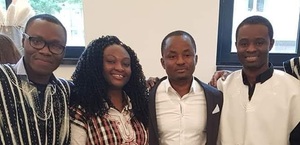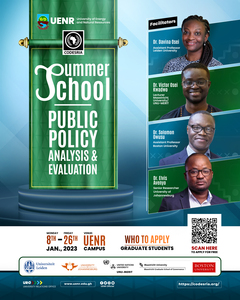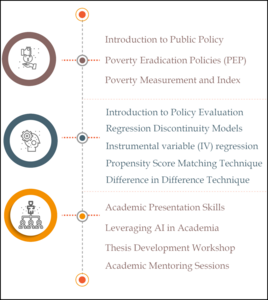By Victor Osei Kwadwo, researcher and lecturer at UNU-MERIT
In March 2023, three friends and I – all of us graduates of UNU-MERIT’s PhD programme – were thrilled when we stumbled upon a research fellowship opportunity in Africa, our home continent. Unfortunately, it turned out that the call was for individual three-month research stays. Our lives (some of us being parents) and newly launched careers simply wouldn’t bend that far.

L-R: Solomon Owusu, Davina Osei, Elvis Avenyo and Victor Osei Kwadwo
But, as any good scholar knows, constraints breed creativity. Instead of letting the opportunity slip through our fingers, we decided to rethink the concept of a research stay. What if, instead of individual studies, we could bring our accumulated knowledge back to our continent through a dynamic, collaborative venture? And so we created a three-week summer school on Public Policy Analysis and Evaluation in Africa.
Pitching this to the funding organization (the Council for the Development of Social Science Research in Africa) meant proposing something radically different from the individual research stays they envisioned. And yet our team-run summer school idea, fueled by our shared passion for empowering African scholars with practical skills, resonated with the Council, and they agreed to fund the endeavor.
And so, from 8 to 25 January 2024, against the backdrop of baobab trees and vibrant discussions, our summer school blossomed at Ghana’s University of Energy and Natural Resources (UENR). We weren’t just four friends anymore; we were mentors, facilitators and cheerleaders for a diverse group of aspiring African scholars. Together, we delved into the nitty-gritty of public policy, dissecting case studies, sharpening analytical skills and learning from each other’s experiences.
While we had predicted our summer school would attract mainly a local crowd, it ended up garnering participants from across Africa – Kenya, Ethiopia, Nigeria, Liberia and Ghana. Even a bubbly 64-year-old PhD candidate participated. As such, we forged bonds that transcended borders and disciplines. Classrooms buzzed with lively debates using Maastricht University’s Problem-Based Learning approach, meals were grounds for insightful conversation, and evenings were spent under starlit skies discussing the challenges and opportunities of African policy landscapes.
The impact wasn’t limited to those three weeks. Our participants left equipped with new tools and a network of peers to tackle the policy issues facing their communities, share newfound knowledge with their institutions and ignite real change.
Our summer school story isn’t just about defying expectations; it’s about the power of collaboration, the unwavering spirit of African academia and the transformative potential of education. It’s a testament to the fact that sometimes, the greatest research doesn’t happen in isolation but in the vibrant exchange of ideas between passionate minds.
So, remember: calls for ‘research stays’ – or any other call, for that matter – can prove to be something so much more than you might have imagined.
ANY COMMENTS?
NOTA BENE
The opinions expressed here do not necessarily reflect the views of UNU.
MEDIA CREDITS
Flyer created by the University of Energy and Natural Resources in Ghana






